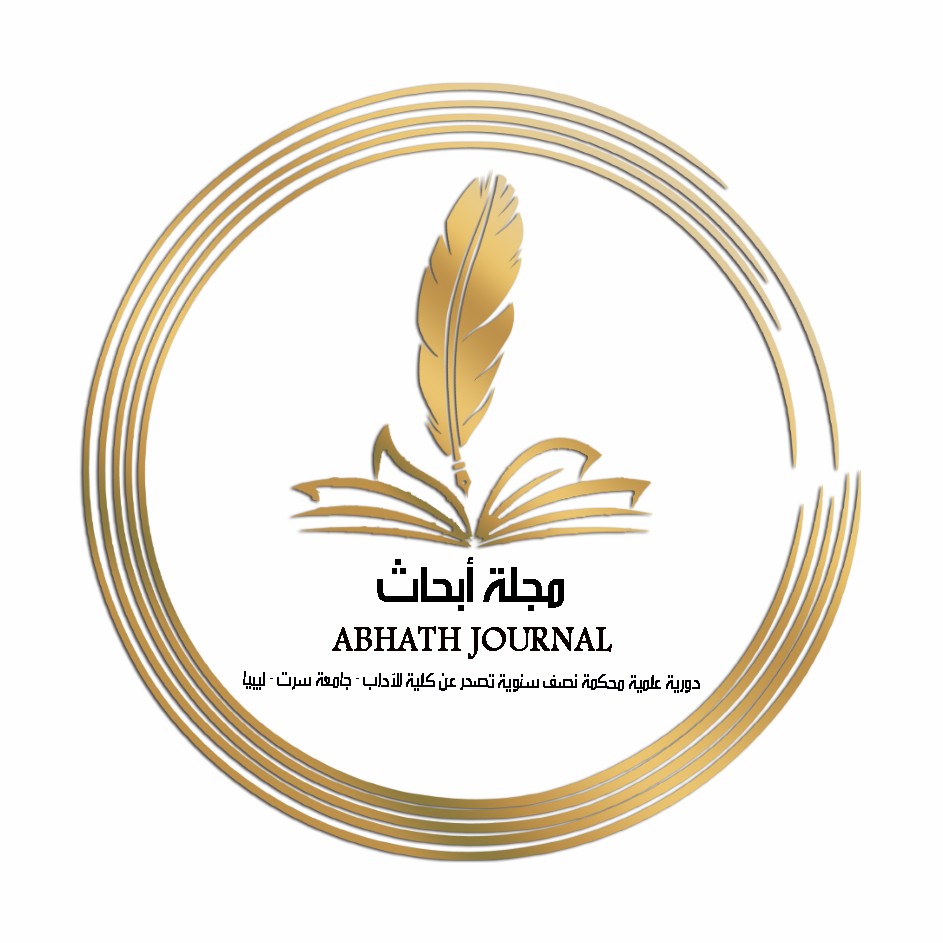Journals
-
Sirte University Journal of Humanities
Sirte University Journal of Humanities (SUJH) is a peer-reviewed scientific periodical published by Sirte University, Libya, in June and December of each year. It is headquartered at Sirte University, Sirte City, Libya.
The journal was established in 1997 under the name The Scientific Journal of Al-Tahadi University. In 2007, its name was changed to Al-Tahadi University Scientific Journal. In 2014, the journal was renamed Sirte University Scientific Journal.
Until 2020, the journal published scientific research in two sections: the first devoted to applied sciences and the second to humanities and social sciences. In 2021, the journal was restructured into two separate journals: one for applied sciences under the title Sirte University Scientific Journal, and a second, dedicated to publishing research in the fields of humanities, under the title Sirte University Journal of Humanities (SUJH).
https://doi.org/10.37375/issn.2789-2247
E-mail: sujh@su.edu.ly
-
Sirte University Scientific Journal
SUSJ is a scientific refereed journal issued on behalf of Sirte University in a number of issues throughout the year interested in publishing research and documented studies in the field of applied sciences for university faculty members and other universities from inside and outside Libya.
The views expressed in the publication are the individual opinion of the author(s) and they neither represents nor reflect the opinion of the editor and editorial board or Sirte University.
https://doi.org/10.37375/1575 -
Economic studies journal
We are pleased to put in the hands of our honorable readers the Journal of Economic Studies; We hope that they will find it what will benefit them and benefit them in their scientific and practical matters. The Journal of Economic Studies is concerned with publishing scientific research in various economic, administrative, financial and other related disciplines. It publishes original scientific research that meets the conditions of scientific research in terms of presentation, investigation and proper follow-up of the scientific methodology.
-
Abhat Journal
A peer-reviewed scientific periodical journal concerne with publishing scientific research in the field of humanities and social sciences, contributing to creating opportunities for research competition among researchers and academics and enriching the world of knowledge dissemination. It is issued by the Faculty of Arts, University of Sirte, Libya twice a year, in March and September. It bears legal deposit number 393/2015, and the International Standard Serial Number ISSN 2518 5985.
-
Scientific Journal for Faculty of Science-Sirte University
The Journal of the Faculty of Science, University of Sirte is a peer-reviewed scientific journal published electronically on a semi-annual basis, in April and October. The journal is freely accessible through its official website, ensuring wide dissemination of published content. It welcomes original research of high scientific quality across all disciplines of basic sciences—both theoretical and applied—including mathematics, statistics, physics, chemistry, zoology, botany, microbiology, astronomy, computer science, information technology, geology, environmental sciences, and marine and ocean sciences.
The journal accepts various types of scholarly contributions, including original articles, review papers, short communications, methodological papers, case studies, case reports, and special issues from scientific conferences and seminars endorsed by the Faculty’s Scientific Research Authority. Submissions are welcomed from both within the University of Sirte and from other academic institutions in Libya and abroad.
The journal was established by Presidential Decision No. (11) dated April 29, 2021, and the editorial board was appointed by Decision No. (194) dated May 25, 2021.
-
Faculty of Education Scientific Journal
المجلة العلمية لكلية التربية : هي مجلة علمية محكمة دورية نصف سنوية، تصدر عن كلية التربية جامعة سرت، وتعنى بنشر البحوث العلمية في مختلف مجالات المعرفة العلمية.
-
International Journal of Engineering Research
The International Journal of Engineering Research is a new journal that provides solutions of faculty members to publish their research through a scientific platform concerned with scientific research and issuing their research in modern ways.
-
Sirte Journal of Medical Sciences
https://www.doi.org/10.37375/issn.2957-3572
Sirte University Journal of Medical Sciences, a semi-annual refereed medical journal specialized in publishing research and scientific articles in the field of Medicine, Dentistry and Health sciences. It was established by a decision of the University President No. (12) For the year 2021 on 04/05/2021, and the Journal obtained the legal deposit number (991/ 2021) from the National Library.
Through the journal, scientific medical research is published, which aims to see the latest medical research and studies and how to deal with diseases and causes, treat them and limit their spread.
The Journal targets specialists and specialists in the field of medical and allied sciences to include all medical fields in medicine, dentistry, nursing, applied medical sciences, pharmacy and public health, in addition to researchers in the field of medical sciences.
The journal is pleased to invite all researchers to publish their scientific research in it to enrich scientific research in the field of medical sciences.
-
مجلة أبحاث قانونية
مجلة أبحاث قانونية التي أسستها كلية القانون بجامعة سرت بموجب قرار مدير عام الادارة العامة للمطبوعات رقم (14) لسنة 2004م بشأن الاذن بإصدارها كمجلة دورية علمية محكمة تصدر بصفة نصف سنوية بالإضافة لإمكانية إصدار عدد خاص، والتي تعتبر كإضافة للإصدارات القانونية المتخصصة في ليبيا ، وبفضلها تكون أحد وسائل المعرفة قد سنحت أمام الباحثين والمهتمين بالشأن الحقوقي بشكل عام والقانوني بشكل خاص ، ولعل فرض العين في مجال البحث الذي جعله المشرع الليبي في لائحة التعليم العالي رقم 501 لسنة 2010م على كل أعضاء هيئة التدريس الجامعي من موجبات صعودهم في سلم الترقيات العلمية وما يمور به المجتمع الليبي من قضايا مختلفة تثير جدلاً كبيراً على مستوى القضاء والفقه على حد سواء يُحتمان على كل المتخصصين المساهمة في إثراء الموضوعات المختلفة في مجال القانون بما يخدم المجتمع الليبي ويُعينه على ما يعانيه راهناً من أزمات ومشاكل مركبة.
Doi: https://doi.org/10.37375/issn.2959-0434
-
Journal of future studies Sirte University
Journa of future studies Sirte University (JFSSU)
مجلـة الدراسـات المستقبلية جامعة سرت مجلة علمية محكمة تصدر عن المركز الأكاديمي للدراسات المستقبلية بجامعة سرت تأسست سنة 2024 تحت رقم إيداع قانوني 244/2024
-
Libya Journal of Geographical Studies
The Libya Journal of geographical studies is a refereed and classified scientific journal, established based on the decision of Mr./ Chairman of the Central Region branch of the Libyan Geographical Society No. 1 for the year 2021. The magazine is published semi-annually with two issues per year (in January and July of each year), and carries the legal Deposit number (557/2021) at the National Book House in Benghazi, and is accredited by the Department of publications and works of art at the Ministry of culture and Knowledge Development in Tripoli by Decision No. 17 of 2022 issued by the director of the General Directorate of publications and works of art affiliated, in addition to obtaining the international standard serial number is line ISSN: 2789-4843 and print ISSN: 3080-0463, and the Journal has an Arab impact factor of (1.35) in 2025, and was also classified in the third category Q3 in the impact factor and reference citations of Arab journals (arsif) in 2025. The journal was also classified in the fourth category (Q4) in the Libyan electronic journal directory in 2024, and is an official member of the Crossref organization, where its research includes digital object identifiers DOI. The journal is also indexed within Google Scholar , and Researchgate Academia.edu, and databases of knowledge of the Hashemite Kingdom of Jordan.
The Libya Journal of geographical studies is concerned with providing researchers in Libya and all countries of the world with the opportunity to publish their original and objective research in various branches of geography and Sciences related to geography (such as: population, climate, geology, agriculture and Economics) in both Arabic and English, according to the standards of sober scientific research, with strict adherence to intellectual property laws and academic publication ethics. The research published in it is allowed to be downloaded free of charge from its website.
-
Albayan Scientific Journal
هي مجلة علمية محكَّمة تصدر دورياً عن نقابة أعضاء هيئة التدريس بجامعة سرت، أُنشأت بموجب قرار السيد نقيب عام أعضاء هيئة التدريس الجامعي بليبيا رقم (9) لسنة 2018 م، تحت إشراف الهيئة الليبية للبحث العلمي، تُعنى بنشر البحوث والدراسات العلميَّة الموثقة لأعضاء هيئة التدريس في مختلف المجالات.
رقم الايداع بدار الكتب الوطنية بنغازي (212 /2019 )
ISSN:2790-0614













